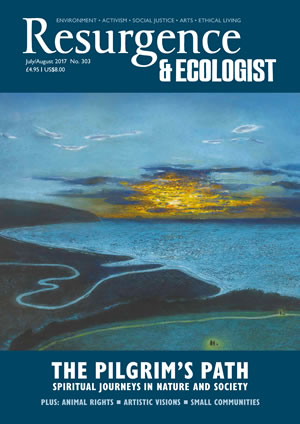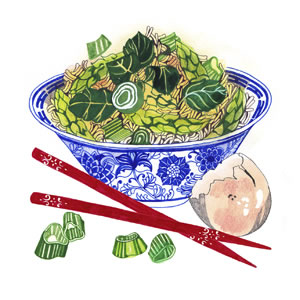We are all now aware that diet and health are inextricably linked, yet the decisions we have to make about something as seemingly simple as eating have never been more complex. Once upon a time all but the very rich ate locally and organically grown foods, in season, supplemented by whatever could be preserved by time-tested methods. Nowadays the globalisation of the food business, the ruthless spread of junk food and food-like substances, the exploitation and destruction of soil and other natural resources, and the loud competing claims for this or that diet mean that the question of how to feed ourselves and our families – for health, for affordability, for fairness and for sustainability – has become both pressing and difficult to answer.
My 40-year study of Chinese health traditions has convinced me that many of the answers lie in the wisdom of our ancestors. For at least 2,500 years Chinese medical and health practitioners have been refining the art of what is known as yangsheng (the nourishment of life). While recognising that our constitution and our good or bad fortune both play important roles, it is understood that our lifestyle choices can maximise our chances of enjoying health, wellbeing and long life. Rooted in Daoism, a philosophy that takes Nature as its inspiration, its vision of health and harmony further extends to the entire natural world.
Whilst every aspect of lifestyle is considered to play a part, the four key pillars of health maintenance are diet, exercise, sleep, and cultivating the mind and emotions.
Over 2,500 years ago the Chinese Imperial medical services classified diet as the highest form of medicine. Even today, few visits to a Chinese doctor are complete without dietary advice. As the Chinese proverb goes, “Those who take medicine and neglect diet, waste the skills of the physician.”
In a short article it is impossible to cover the many features of traditional dietary practice for health and wellbeing, but I can introduce a few key points. The first two concern the ‘how’ of eating – considered to be at least as important as the ‘what’.
1. Eat less
Every Chinese person knows the saying, “When eating, stop when you are seven-tenths full.” Eating less is believed to benefit physical and mental health, successful ageing and longevity, and this is clearly borne out by modern lifestyle research. What is known as a “nutritionally complete calorie-restricted diet”, in all species studied to date, demonstrates exactly these results – better health, longer life and a reduced risk of cognitive decline. But we don’t have to resort to counting calories to achieve this. All we have to do is allow ourselves to remain a little bit hungry most of the time – even at the end of a meal. It can take time and commitment to get used to doing this, partly because being truly hungry makes even the simplest food taste delicious. All the evidence, though, is that the benefits are worth it.
2. Don’t eat late in the day
An old English saying goes: “Breakfast like a king, lunch like a merchant and sup like a pauper,” while a more acerbic version is found in the Jewish “Eat your breakfast alone, share your lunch with a friend, and give your supper to your enemy.” The Chinese health tradition teaches that human digestion mirrors the rising (yang) and setting (yin) of the sun. From dawn to midday, our metabolism is at its most active and efficient. As yang starts to decline and yin grows, it is at its weakest. Research clearly confirms this finding (if not the reasoning behind it). It has consistently revealed that we can eat larger meals and more calories overall in the morning, without putting on weight, than if we eat late in the day.
Above all, health preservation teachings warn against going to bed with a full stomach. Slow metabolism and physical inactivity mean that food remains undigested through the night. The result is lack of appetite the following morning, more bloating and discomfort, and, over time, real digestive disease. This, along with eating while stressed, preoccupied, angry or frustrated, is one of the main causes of the extraordinary amount of digestive disease (accounting for more over-the-counter medicine sales than for any other problem).
3. Balance rich and plain foods
"Those poor and humble people in the mountains and wilderness know nothing but a bland and homely [diet] but their movements never betray decrepitude and their bodies remain safe and sound their entire lives." - Zhu Danxi(1281–1358)
The core Chinese principle of harmony is reflected in the balance of light (qing dan, pronounced ‘ching dun’) foods with more nutritious, rich and strongly flavoured (wei, pronounced ‘way’) foods. Light cereal grains (preferably unrefined), pulses and vegetables should form the foundation and the greatest proportion of our diet. They are supplemented by more nourishing or flavoursome foods such as oil, fat, spices, vinegar, soy sauce, meat, fish, dairy foods and sweet fruits. But this is not a static balance. More rich foods are appropriate in winter and for those who live in cold or very dry climates, do manual labour or physical training, are young (especially teens), or are pregnant or nursing. Fewer rich foods are necessary if we are sedentary (as most of us are) or elderly.
One of the many problems with modern Western diets is that they are predominantly composed of rich foods (high fat, high sugar, high salt), resulting in over-nutrition, obesity, a greater likelihood of developing chronic degenerative disease, and a disastrous farming system designed to maximise animal food production at all costs.
4. A modern perspective
We have reasons to be grateful for modern agriculture. Despite the fact that famine still exists, most of us have more reliable access to food than at any time in our history. Yet readers of Resurgence & Ecologist do not need reminding that this comes at a terrible cost. Chronic diseases such as diabetes, cancer, dementia and cardiovascular disease are steadily rising in every country on Earth, partly due to the corruption of traditional diets. The natural world – soil, seas, air, water systems, climate – is being savaged in the interests of food profit and over-consumption. On a personal level, millions of us fight dispiriting battles with weight, various kinds of food obsession and anxiety.
I believe we can draw inspiration from a health tradition that prioritises balance and harmony and the way of Nature. While eating in a way that supports our health and that of our families and is a fair share of world resources, we must also support agricultural and distribution practices that are kind to our fellow creatures, to the earth we depend on, and to the planet itself.







